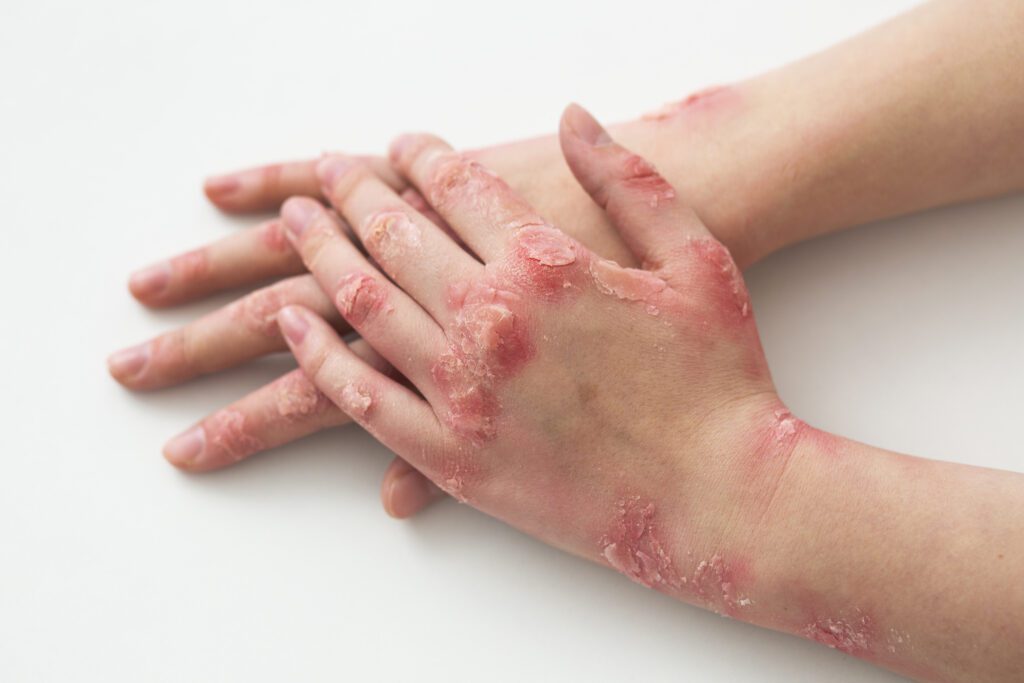Naturopathic Treatment for Eczema
A Root-Cause Approach to Healing Your Skin
If you are living with eczema, you know it’s so much more than just “dry skin.” It’s the persistent, maddening itch. It’s the painful, cracked skin that can make you feel self-conscious. It’s the frustration of trying countless creams and treatments, only for the angry red patches to return.
As a Naturopathic Doctor, I understand the deep physical and emotional burden of eczema. My approach begins with a fundamental belief: eczema is not just a skin issue; it is a symptom of an internal imbalance. Lasting relief comes not from simply suppressing the inflammation on the surface, but from investigating and addressing the root causes within the body. This guide is here to offer hope and clarity on your path to healthier skin.

Dr. Jennifer Luis, ND
Takes an "inside-out" approach to eczema, investigating underlying triggers like digestive health and food sensitivities to provide lasting skin relief.
What Is Eczema?
Eczema is a general term for a group of conditions that cause the skin to become inflamed, itchy, and red. The most common type is Atopic Dermatitis, which is often linked to a personal or family history of allergies or asthma. While there are several types of eczema (Contact, Dyshidrotic, Nummular), they all share common symptoms:
- Intense itching (pruritus), which often leads to a disruptive “itch-scratch cycle”
- Dry, sensitive skin
- Red, inflamed patches
- Rough, leathery, or scaly areas of skin
- Oozing or crusting in severe cases

Eczema can begin at any age but is very common in infants and children, though many adults continue to struggle with it or develop it later in life. While the conventional medical view often focuses on managing inflammation with topical steroids and antihistamines, a naturopathic approach seeks to understand why the inflammation is happening in the first place.
Common Root Causes from a Naturopathic Perspective
Eczema is a signal from your immune system that something is out of balance. My work as a naturopathic doctor is to play detective and uncover your unique triggers. Here are some of the most common root causes we investigate:
The gut-skin axis is a powerful connection. An unhealthy gut, characterized by “leaky gut” (increased intestinal permeability) or dysbiosis (an imbalance of good and bad bacteria), can allow inflammatory molecules to enter the bloodstream, triggering skin inflammation.
Unlike immediate food allergies (IgE-mediated), delayed food sensitivities (often IgG-mediated) are a very common trigger for eczema. The most frequent culprits include dairy, gluten, eggs, soy, and corn, but can be unique to the individual.
Your skin is in constant contact with the environment. Triggers can include harsh soaps and detergents, synthetic fragrances, dust mites, pet dander, and environmental toxins like hidden mold, which can put a significant strain on the immune system.
Eczema is fundamentally an immune issue. Naturopathic care focuses on modulating and balancing the immune response, rather than simply suppressing it.
The mind-skin connection is undeniable. High levels of stress increase cortisol and inflammation, which can directly trigger or worsen eczema flares.
Key nutrients are vital for skin barrier function and immune health. Deficiencies in zinc, omega-3 fatty acids, and vitamin D are commonly seen in individuals with eczema.
Functional Testing & Diagnosis
To move beyond guesswork, we utilize functional testing to build a clear, personalized picture of your health. This can include:
To move beyond guesswork, we utilize functional testing to build a clear, personalized picture of your health. This can include:
Comprehensive Stool Testing
To assess your gut microbiome, check for pathogens, and evaluate markers of inflammation and digestion.
Food Sensitivity and Allergy Testing
To identify specific foods that may be triggering an immune response.
Hormonal and Adrenal Function Testing
To evaluate the impact of stress (cortisol) and other hormones on your skin health.
These detailed lab results, combined with a thorough intake assessment of your health history and lifestyle, allow us to create a truly targeted treatment plan.
A Naturopathic Pathway to Healing
My approach to managing eczema is holistic and tailored to your specific root causes. A typical plan involves:

Personalized Nutrition:
- We focus on an anti-inflammatory, whole-foods diet and create a plan to strategically eliminate and reintroduce potential food triggers.
Gut Healing Protocols:
- We work to repair the gut lining, rebalance the microbiome with probiotics and other supportive therapies, and optimize digestion.
Calming Topical Relief:
- While we work on the internal causes, I can recommend natural and gentle topical applications to soothe itching and support skin barrier repair.
Stress Management & Sleep Support:
- Implementing strategies to manage stress and improve sleep is crucial for calming the nervous system and reducing inflammation.
Restoring the Skin Barrier Holistically:
- We use targeted nutrients and herbs to support skin health from within.
Modulating the Immune System:
- The ultimate goal is to help your immune system become more balanced and less reactive, leading to long-term relief.
Lifestyle and Prevention Tips
- Skin-Care Do’s: Use gentle, fragrance-free cleansers and moisturizers. Moisturize immediately after bathing to lock in hydration.
- Identify Triggers: Keep a journal of diet, stress levels, and environmental exposures to identify patterns in your flares.
- Choose Clothing Wisely: Opt for soft, breathable fabrics like cotton.
- Mindful Bathing: Avoid long, hot baths or showers, which can strip the skin of its natural oils.
- Consistency is Key: Long-term care and proactive management are essential for keeping eczema in check.
Frequently Asked Questions About Eczema
While there may not be a one-time “cure” for the tendency towards eczema, it is absolutely possible to manage it so effectively that it goes into remission and no longer impacts your quality of life. The goal is to identify and address your root causes to minimize or eliminate flares.
Both are inflammatory skin conditions, but they have different underlying immune mechanisms. Psoriasis typically appears as thick, red, scaly plaques, while eczema is often characterized by intense itching and a different type of rash. A proper diagnosis is key.
Yes. The immune and endocrine (hormone) systems are intricately linked. Conditions like Hashimoto’s (autoimmune thyroiditis) can be associated with other autoimmune tendencies, including eczema. Hormonal fluctuations can also influence skin inflammation.
For some people, identifying and removing a single food trigger can lead to complete resolution. For most, however, diet is a powerful and essential piece of a larger, comprehensive plan that also addresses gut health, stress, and other contributing factors.
Ready to Uncover the Root Cause of Your Eczema?
If you are ready to move beyond managing symptoms and explore a personalized, naturopathic approach to healing your skin from within, Dr. Jennifer Luis is here to help guide you.